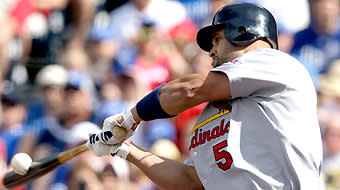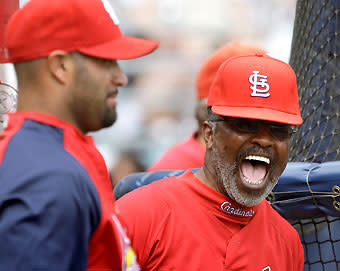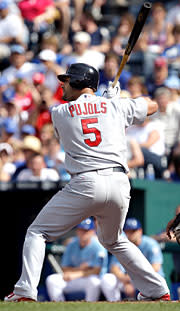Pujols is a faith-based mystery

Albert Pujols(notes) has 32 home runs at the All-Star break.
(Jamie Squire/Getty Images)
ST. LOUIS – Sometimes during the daily pregame hitters' meeting held by the St. Louis Cardinals, Albert Pujols tells his teammates how he plans to terrorize pitchers that night. He makes no grand proclamation or show of it. Pujols just mentions that he's going to get two hits to right field, or that he'll hit a home run to left field, and then he turns his attention back to the meeting, like his prognostications were small talk and not a sign that he's an oracle living in a ballplayer's body.
Pujols is almost always right. His teammates no longer give each other looks of incredulity when he lines those hits to right or homers to left. By now, they get it. His faith and knowledge are a remarkable duo. Every day, Pujols does something else to remind them that he's the best baseball player in the world and could finish his career in the conversation for the best player ever. No longer is it unusual, not after nine years of death-and-taxes consistency, so the Cardinals who see his exploits every day are resigned to do the same as the rest of the mortals who witness from afar: marvel.
"Enjoy it. Respect it. Appreciate it," Cardinals manager Tony La Russa said. "I'm left with just watching him. And if you watch him, he'll do something to show you how great he is."
It's not even so much how great Pujols is anymore. His transcendence is undeniable, even in a steroids-pocked era that infected record books like a virus. Pujols is the only player alive who could flirt with a .400 batting average and 60 home runs. He may well win the first Triple Crown this season since Carl Yastrzemski more than 40 years ago. He will catch the first pitch from President Obama before the 80th All-Star Game at Busch Stadium on Tuesday, the sort of perquisite reserved for royalty.
No, the real question – the one to which no true answer may exist – is: Why is Pujols successful?
Players are sure that it's innate, because others train similarly to Pujols, and they most certainly don't produce like him. Some scientists argue that it's practice, the maniacal sort that turns muscles and ligaments and tendons into fine-tuned machines and cells into intelligent worker bees that help execute the brain's commands.
And the man himself? Well, there's where it gets a little mystical, and where the mystery of what makes Albert Pujols so great deepens.
The swing hasn't changed. Every day, little Albert Pujols played baseball in the streets of Santo Domingo, the biggest city in the Dominican Republic. He'd go home to different houses and live with different family members and miss meals. He wanted one thing to stay the same, and that was always the fundamental shape of his baseball swing. It was just there, an old friend honed by neither private instruction nor time in the local batting cages.
"I didn't exactly have a coin to go and spend," Pujols said. "And if I did, I'd probably have gone and gotten an ice cream."
Pujols' journey from poverty to a nine-figure contract, a pair of MVP awards and reverence in a city that deifies its ballplayers was tortuous, the lone constant his swing. It accompanied him to Kansas City, where he immigrated with his father and grandmother at 16, and it followed to Maple Woods, a nearby community college, and then to Wichita, Kan., where Pujols made himself a Cardinal.

Hall-of-Fame broadcaster Jack Buck interviews Cardinals rookie Albert Pujols in April, 2001.
(Tom Gannam/AP Photo)
Teams drafted 401 players before St. Louis selected Pujols in 1999. The Cardinals offered him $10,000. They feared Pujols, already edging toward portly, might altogether balloon. They wondered if he was older than 19. All of it insulted Pujols. Cardinals general manager John Mozeliak, then the scouting director, wanted to understand why Pujols thought he was worth so much more and went to see him at the National Baseball Congress tournament in Wichita.
"I watched him for a day," Mozeliak said, "and that's all I needed."
The Cardinals came back with $60,000. Pujols signed and spent most of 2000 with Class A Peoria. Tom Lawless, his manager, constantly fined Pujols $50 for not running hard enough. If he loafed twice, it was $100. As the year progressed, the shape of Pujols' torso inverted, a pear turning into a V. His mind matured, too, past the individuality of high school and juco ball and toward the idea of winning. The only thing that didn't change was the swing, ever strong and intimidating.
"You do it so much over and over and over, you get it to the point where it registers in your mind that you're going to succeed," Pujols said. "That's what you want in this game, or in any sport: consistency."
“You do it so much over and over and over, you get it to the point where it registers in your mind that you're going to succeed. That's what you want in this game, or in any sport: consistency.”
– Albert Pujols
Since Pujols joined the Cardinals the next season, his hallmark has been frightening consistency. Every year, he has hit at least .314. His low-water mark was 32 home runs and 103 runs batted in. Pujols instills irrational fear in opposing managers and pitchers. They're scared to throw him first-pitch strikes – his 47.4 percent rate of seeing such pitches is third lowest in the major leagues – because he hammers first pitches. Though, to be fair, he can hammer pretty much any pitch in any situation, so great is his talent. Soon enough someone will walk Pujols with the bases loaded, seeing as he's 6 for 8 with four grand slams in such situations this season.
"His bad swing is a line drive over short," Cardinals outfielder Skip Schumaker(notes) said. "You can't take anyone off the street, make them take 1,000 rips a day and turn them into Albert.
"Some people have it. Albert's got it. You think you have it when you make it to the big leagues, and then he makes this look like Double-A."
Mozeliak wants to tell his players to emulate Pujols, but he knows they can't. It's like asking someone to watch Beethoven play the piano and then go perform Concerto No. 5. The eyes can't possibly process what lives in Pujols and what makes his swing operate the way it does.
"He's not somebody who wakes up, rolls out of bed and hits .330," Mozeliak said. "Though I'm pretty sure he could."
Outside the batting cage in the depths of Busch Stadium, Pujols leaned against a door frame. A few minutes earlier, he heard his name on a TV in the clubhouse. The previous night Pujols had hit his 30th and 31st home runs of the year, and the show's host, Keyshawn Johnson, started talking about steroids. Pujols was still fuming.
"You can't just have a great year," he said. "When are they going to believe that I don't use steroids?"

Hitting coach Hal McRae (R), jokes with Pujols during batting practice. "I've never seen anyone like him," McRae said.
(Charles Krupa/AP Photo)
Pujols stepped into the cage. Hitting coach Hal McRae underhand tossed a ball to him, and Pujols whacked it, same as always. For four years, McRae has practiced a routine with Pujols that never deviates, not for rain, not for snow and certainly not for some ex-football player windbag.
This is where Pujols refines his swing. It's a spartan space, white-walled with a few nets to catch balls, a refrigerator to cool drinks and little else. Not exactly where you'd tune a Stradivarius.
Witnesses to Pujols' daily batting-practice sessions compare them to the tuning of a fine instrument. He stands in, feet wide, arms bouncing rhythmically, head still as a bust, and after each swing he makes the tiniest tweak, lest he not scorch every ball with more ferocity than the previous.
He is the living example of Anders Ericsson's 10-year, 10,000-hour rule. Ericsson, a psychologist who has devoted three decades to plumbing the question whether talent is innate or learned, believes 10 years and 10,000 hours of deep, intense practice can manifest itself with genius performance. And further research, highlighted in Daniel Coyle's new book "The Talent Code," hypothesizes that such practice supercharges neurons with a substance called myelin, which leads to better performance. The idea that Pujols' swing traveled with him as a child and all the way to now – that it's a gift – is likely an exaggeration, according to those who consider myelin a wonder substance.
They would see Pujols as something of a machine, one that could turn rusty were he to change in any way.
"You'd think this guy would take a day off," Schumaker said. "He can. He'd be fine."
"No, I wouldn't," Pujols said. "Working hard got me where I am. Why do I want to stop what I'm doing? I don't want to. I want to continue to be successful."

Albert Pujols is 6 for 8 with the bases loaded, including four grand slams.
(Jamie Squire/Getty Images)
Pujols arrives at the stadium around 2:30 p.m. to watch video of himself and the opposing pitcher. Next, he heads into the trainer's room for treatment of his aching pieces and parts – Pujols plays first base with a shredded elbow ligament that eventually will require Tommy John surgery – before hitting the cages for the first time, where he takes 30 or 40 swings. Following another 30 in batting practice, Pujols sequesters himself in the video room for another half hour before another 30 swings at 6:30 or 6:40 p.m.
"He doesn't throw away swings," Cardinals outfielder Chris Duncan(notes) said. "Every swing, he's focused. He takes time in between. He's not in there aimlessly swinging. You can tell he's got an idea of what he's working on."
Sometimes Pujols closes his stance too much. Occasionally his hands drift a little high. McRae generally doesn't bother piping in. Pujols gets moody, preferring concentration to chatter, and it's a chore criticizing someone like him anyway.
"I've never seen anyone like him," McRae said, and neither has anyone in the Cardinals' clubhouse. It's not just the physical toll that 100 swings takes on the body. Pujols withstands any urge to take a break for even one day.
"He'd be the same guy," McRae said. "I've told him that."
Pujols doesn't listen. This isn't about him, or his customs, or doing something for the sake of doing it. He prepares this way for a reason.
Someone told him to.
"God tells me what I need to do," Albert Pujols said, "and I go out and do it."
God is a constant figure in Pujols' life ever since his wife, Deidre, took him to church in 1998 when they started dating. He believes God introduced him to her, and he believes God let him slip to the 13th round to properly motivate him, and he believes God made it so that Bobby Bonilla pulled a hamstring in spring training in 2001, allowing Pujols to play in his stead, win a job and jump start a career.

Albert Pujols celebrates with his son, AJ after winning the World Series against Detroit in 2006.
(Jed Jacobsohn/Getty Images)
"I don't believe in all that science stuff," Pujols said. "I believe in Jesus Christ, who gave me the strength and power and talent to honor him. You can always try to figure it out and be scientific and look for success. Not me. It's dedication, hard work, practice and God."
God is everywhere with Pujols. He preaches. He prays. He hosts Christian Family Day at Busch Stadium. He gives to charity and runs a foundation and is the true mayor of St. Louis, because God tells him that's who he needs to be.
"It's all God, man, the way he has used me so far this season," Pujols said. "I give credit to him because there are some days where I wake up, like, man. Those day games, 12 o'clock games, after a night game. And he's still using me out there to perform."
As conditioned as we are to hear the word God out of an athlete's mouth and immediately tune it out, knowing well the hypocritical piety perpetuated by so many, what if there really is something to Pujols' devotion? What if it weren't so much faith vs. science but something more symbiotic: faith driving science? Without God, Pujols might be like a Bentley without a key. Belief in God ignites something inside of Pujols, something that motivates him to train, to draw out whatever resides inside of him, no matter whether inborn or developed. He traces all those hours in the cage and all that natural ability to the breadth of his belief.
Take God away, and Pujols believes he's just another ballplayer, not the greatest of his generation. He might be right.
The idea of faith driving Pujols is fitting, as rooting for him requires a hearty helping, too. His talents are so remarkable, his accomplishments so towering, his standing so impermeable that it puts him in a modern echelon occupied mostly by players later proven as golden calves.
Only Pujols remains clean, Alex Rodriguez(notes) shamed, Manny Ramirez(notes) shamed, Barry Bonds(notes) and Sammy Sosa(notes) and Mark McGwire shamed. He plays the same position for the same team as McGwire, drives down the Mark McGwire Highway on his way to the ballpark and hits his home runs toward a sign in left field that reads BIG MAC LAND, one particular blast this year knocking the lit-up "I" dark. Pujols is this generation's hope, someone who can walk alongside Ken Griffey Jr.(notes) into the Hall of Fame without any lingering questions, someone who preached faith and rewarded the believers.
“Why am I going to sit up and look at numbers, man? That's not how I approach this game.”
– Albert Pujols
Pujols is 29. Health permitting, he will produce for at least six or seven years, and he could well play another decade. His first nine years mirror those of Joe DiMaggio. Pujols lives in that class, with DiMaggio and Ruth and Aaron and Williams and Mays and Gehrig and Mantle.
"Why am I going to sit up and look at numbers, man?" Pujols said. "That's not how I approach this game. If I can stay healthy and continue to do what I do, I'm going to have plenty of time to look at the numbers at the end of my career. So why sweat it right now? Why think about it?"
Because it's all so novel, the faith-driven player whose contemporaries spat all over belief. They flipped the paradigm: It's now tougher to buy that Pujols was blessed with talent, or grew it himself through practice, or some combination therein. To have faith in Pujols is to have it of the purest kind: dead blind, based on something no one knows nor can prove.
Gone are the naïve days of Ruth fueling himself with hot dogs and beer. Pujols may ultimately be his equal, and whether that bat came from his genes or his habits or his God or somewhere else will remain a mystery.
All that's left to consider is the person: Albert Pujols, superstar, man of faith in a sport where it no longer exists.
